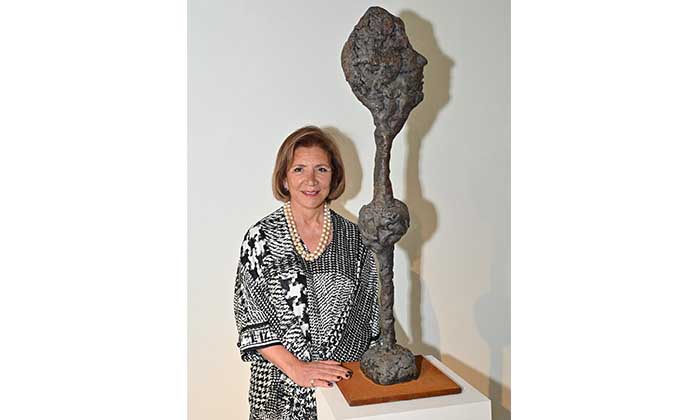« Caminante » Exhibition at the Cervantes Institute of Beirut: Alida Torbay, an Artistic Journey Exploring the Very Nature of Existence
« Caminante, no hay camino, se hace camino al andar » (Traveler, there is no road, you make your own path as you walk), Machado’s words come to challenge Alida Torbay and inspire her to sail in an artistic journey to explore the very nature of existence. She unveils a masterpiece, mirroring an introspection of the evolution of the world. Indeed, Alida draws from her own travels around the world, as well as the experiences, the encounters that paved her path, therefore inviting us to dwell on our own journey through life. The exhibition presents a mixture of captivating bronze sculptures and installations symbolizing the dynamic nature of travelling.
According to Alida Torbay, “The path does not exist, it is but a fiction, a succession of lived moments and experiences that build a human being, while being seduced, possessed by our experiences, we do not seize to know that we are only spectators, sitting on an armchair, watching an imaginary show.”
The public is already welcomed at the entrance by “Caminante”, a bronze sculpture accompanied by six others made of resin, all representing giant steps, visually illustrating the constant progress of the individual throughout the world. Three bronze statues occupy the garden, each carrying its own connotation: one, incarnating a representation in a seated position on a bench with an open suitcase, symbolizing the permanent settling down in the country. Next to it, “The Girl with Balloons” incarnates the dream and the lightness while “The Girl in a Mask” reminds us of our dual identity, represented by the masks we wear throughout our life.
Inside, visitors discover a selection of 20 sculptures, old and new, three of which stand out for the particular importance. “The Mask Walker”, carrying a video in his belly, explores the complexity of our identity, that is shaped by the masks we wear. Two brides, one in white, the other one in black, respectively reflect the decomposition of nature, the claim for difference and the fight for freedom in the face of the challenges of our era, the religious dogmas, the endangered democracies, the new dictatorships of all kinds, and the inhumane technology. Alida Torbay’s approach aims at reminding us that democracies and freedoms are highly at risk in case we do not defend them.“Caminante” is much more than a simple art exhibition, it is a true artistic odyssey that transports the spectator throughout emotions and experiences that have marked the life of the artist, a visual and sensory exploration. Through a series of bronze sculptures, immersive installations and evocative videos, she guides us on an introspective journey, inviting us to reflect on our own life path.
Universal themes lie in the heart of “Caminante”: identity, the passing of time, freedom and the human condition. From Machado’s timeless words, Alida Torbay strives to explore the human soul, inviting us to contemplate our own existence with new and open eyes. However, she especially calls us to action since it is an invitation to reflect on our place in the world and the values that enliven us. In this world of perpetual motion, where certainties seem so friable, where traditional benchmarks are questioned, “Caminante” comes to offer a space of reflection and contemplation, an opportunity to reconnect with the essential and the authentic in our lives, through an artistic journey that will awaken your senses and feed your spirit.
This multimedia immersive exhibition, produced in collaboration with the Cervantes Institute of Beirut, and directed by Mrs. Yolanda Soler Onis, the director of the Institute, offers a profound reflection on the human conditions and the modern challenges we face.
The exhibition will be on view until June 27 at the Cervantes Institute in Beirut. It will then move to the Cervantes Institute in Tripoli. At last, it will be presented at the “MACAM” Museum in Alita, Jbeil.


Comments are closed.